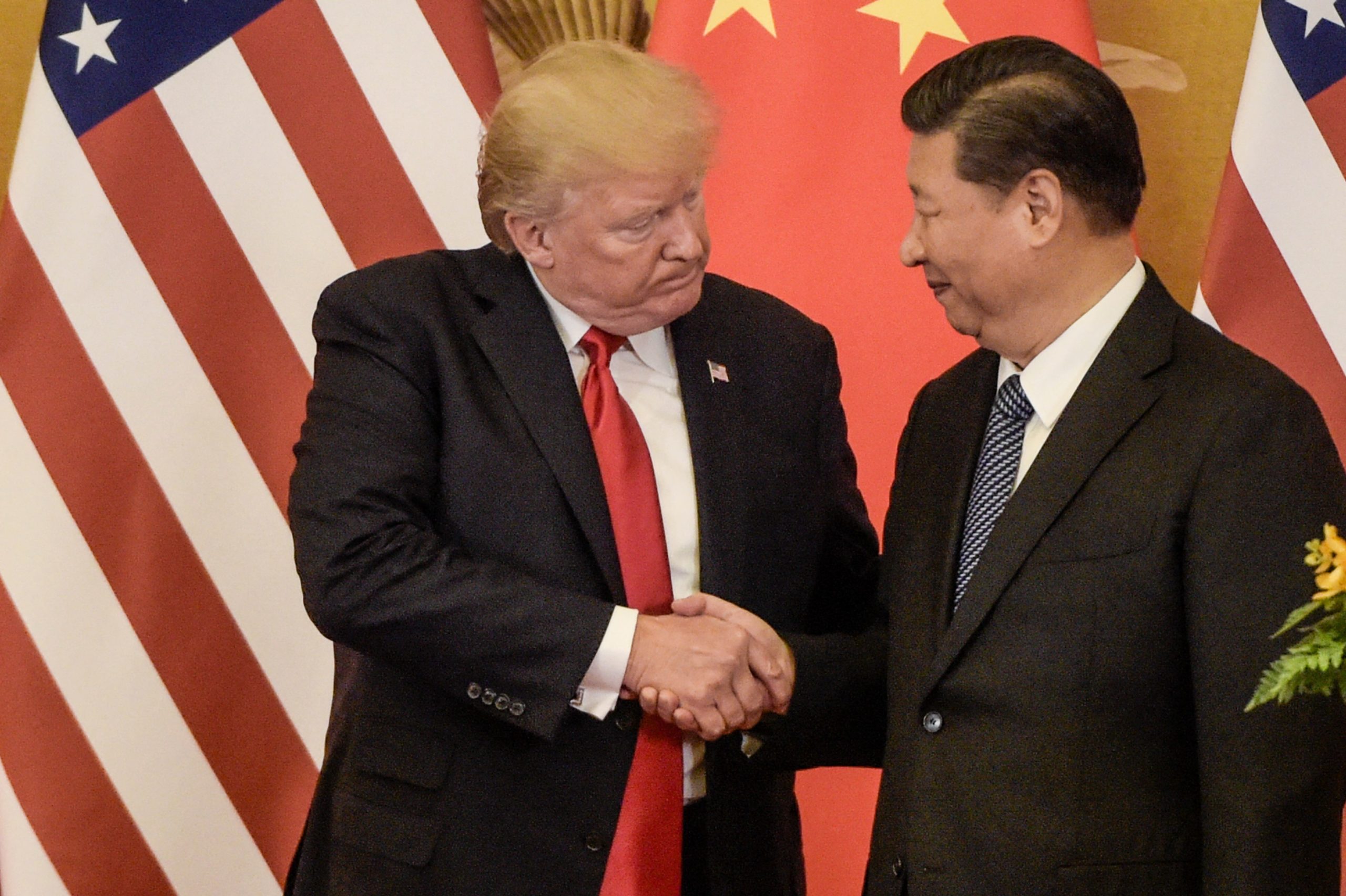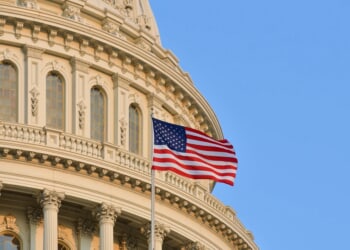President Donald Trump and Chinese President Xi Jinping are in the early stages of a major trade showdown, and each leader is equipped with enough ammunition to inflict serious pain on his adversary.
China has been one of the only countries to retaliate against Trump’s “LiberationDay” levies, bringing its rates against U.S. goods to 125% while the Trump administration imposes a 145% duty for Chinese goods. The world’s two largest economies have the capacity to inflict considerable economic pain on the other, and neither side seems keen to blink first — but experts who spoke to the Daily Caller News Foundation agree that the U.S. will likely be able to inflict more economic damage on China than China can inflict on the U.S.
“Across the board, whether it’s the opposition party, wobbly members of the Republican coalition, different parts of the alleged international community and business and Wall Street, I think a lot of people were exposed as being basically scared, willing to hedge or bet against America, and thought that China was the one with the cards,” Stephen Yates, a senior research fellow focusing on China and national security for the Heritage Foundation, told the Daily Caller News Foundation. “I think, at least for now, Trump has proven that America has the cards.”
Tale Of The Tape
The U.S. has the most powerful consumer market of any country in the world, and China’s reliance on exports means that its economy will likely suffer provided the Trump administration actually enforces its mammoth tariffs against Chinese goods. On the other side of the ledger, China’s ownership of U.S. debt, its dominance of minerals needed to produce advanced military equipment and its demonstrated ability to evade U.S. trade enforcement, among others, are all potential advantages to deploy against the U.S. if Chinese leaders so choose. (RELATED: Scott Bessent Reminds China They Need Access To US Market Far More Than America Needs Access To Their Economy)

President Donald Trump (L) shakes hand with China’s President Xi Jinping at the end of a press conference at the Great Hall of the People in Beijing on November 9, 2017. (Photo by FRED DUFOUR/AFP via Getty Images)
“People can debate whether Trump has played his cards right so far,” Yates told the DCNF. “He has more that he needs to play better over the longer-term, but there are many more countries willing to improve terms of trade, investment and manufacturing with the United States, and I think that the over-dependence on China is now accelerating to safe-shoring among more reliable partners in a way that no policy memo or speech ever was going to accomplish.”
Chinese officials are reportedly reaching out to other countries to try to put together a united front against the Trump trade agenda, but other countries may now be less keen to jump on board with China given that countries who did not initially retaliate against the U.S. saw their reciprocal tariff rates put on hold. Moreover, the Chinese economy was already in dicey shape before the trade war started due to residual impacts of a prolonged slump in its key real estate sector, a growing debt burden and longer-term demographic imbalance coming to bear, according to The New York Times.
China may struggle to find other willing buyers of inexpensive goods that the Trump administration is effectively trying to box out of the market with high duties, as other nations may not be keen to let Chinese goods be dumped into their markets at the expense of their own producers. Even if China cobbles together a coalition of willing buyers to counter the Trump administration, they may still struggle to offset the damage caused to its producers by Trump’s moves to restrict access to America’s consumers.
Treasury Scott Bessent also did not rule out de-listing Chinese companies from U.S. stock exchanges in a Wednesday interview with Fox Business Network.
The White House is confident that the U.S. is embarking on the trade war from a position of strength relative to China.
“President Trump is playing chess while the Chinese are playing checkers, to the detriment of their economy and their people,” White House spokesman Harrison Fields said in a statement to the DCNF. “The President has made it clear that the days of China taking advantage of our workers and economy are over, and his decisive actions WILL HOLD China accountable UNLESS they come to their senses and join President Trump in his efforts to make trade freer and fairer.”
Gordon Chang, a distinguished senior fellow at the Gatestone Institute, believes that the U.S. has a distinct advantage over China as the trade war takes shape.
“President Trump is pointing a howitzer at Xi Jinping, who only has a pea shooter to aim at Trump,” Chang said in a statement to the DCNF. “So can the Chinese dictator prevail over the American president? There is only one way: Convince Trump to preemptively surrender. Xi is trying to get Wall Street, Main Street, and C-suites to pressure the president.”
‘You’re Going To Pay That Tariff’
The Trump administration plans to effectively shut the de minimis exemption for imports effective in early May. The exemption permits shipments of goods with a value of less than $800 to enter the U.S. duty free, but some Republicans have accused China of abusing the loophole to America’s disadvantage.
The Trump administration will need to actually enforce its tariffs against Chinese goods in order for the policy to pressure China in any meaningful way, according to Derek Scissors, an Asia-focused economist for the American Enterprise Institute (AEI). Otherwise, Chinese companies will simply route production elsewhere to avoid higher duties and pay a similar rate to the premium the Trump administration is charging most others to access the U.S. consumer market, Scissors explained.
“If you don’t enforce transshipment rules, which the administration did not do in its first term, the Chinese will pay 10%, which is what everyone else is paying. So, the key thing here, if you wanted to actually stand up to the Chinese, is not saying 54%, 79%, 104%, 125%,” said Scissors. “The key thing is, you say ‘We’re going to provide enough resources to Customs and Border Patrol, they’re going to find out what goods are Chinese, and you’re going to pay that tariff, you’re not going to be able to escape it.’ They’re also going to take away the de minimis exception, which is supposed to happen next month, but we’re not ready to do that either in terms of the process. So, the tariff rate that is getting everyone’s attention, that doesn’t matter that much … What will matter is, are the Chinese going to pay the tariffs we say what they’re going to pay, or are they going to pay 10%?” (RELATED: China’s Trade Surplus Soars To Record Of Nearly $1 Trillion Ahead Of Trump Return)
🚨 Sen. Eric Schmitt: “China needs to be treated differently. China is the most unfair place in the world.” pic.twitter.com/lPZjzy92L5
— Daily Caller (@DailyCaller) April 9, 2025
While China has debt problems of its own, it also owns a large amount of U.S. debt, leading some to fear that the U.S. is in a vulnerable position should Chinese authorities decide to unload that debt onto the market.
China owns approximately $787 billion in U.S. Treasury debt, making it the second-largest foreign owner of American debt behind Japan, according to Reuters. While some analysts are concerned that China could dump its holdings to weaken the dollar and drive up the cost of capital inside the U.S., Scissors argues that the amount of debt that finances the U.S. is so large that China’s holdings do not provide too much leverage.
“China’s share in U.S. financing is small because U.S. financing requirements are so big. That’s not a source of Chinese leverage,” Scissors told the Daily Caller News Foundation. “I know people talk about it all the time. It’s not the case that this matters.”
China’s ownership of American debt may not be as strong of a leverage point as some make it out to be, but there are still other options at its disposal to ratchet up pressure on Trump. For starters, China dominates several key supply chains, including for crucial minerals needed to produce advanced military gear like certain missiles and systems for fighter jets, according to the U.S. Army.
Additionally, the U.S. is currently dependent on China to meet its pharmaceutical needs. The U.S. sources about 97% of its antibiotics, 95% of its ibuprofen and 70% of its acetaminophen directly or indirectly from Chinese suppliers, AEI wrote in August 2024.
Chinese regulators could launch inquiries into American entities or restrict their ability to sell in the Chinese market, or they could simply ban American firms from providing consulting, legal, financial and other services in the Chinese market, according to Barron’s. If Chinese leaders feel cornered as the situation develops, they could also retaliate with non-economic actions; the Chinese military could make a move on Taiwan, look to embolden Iran or stir up trouble in North Korea if China feels enough heat, according to Scissors.
Moreover, China’s authoritarian system of governance affords flexibility and an ability to play the long game that the Trump administration does not have, because the American government is sensitive to the will of American voters, unlike the Chinese system, Scissors explained. Republicans will need to defend their legislative majorities in 2026 — and some congressional Republicans are already uneasy about the president imposing large tariffs without legislation — and there is no guarantee that there will be a Republican in the White House in 2029 with an appetite to take on China.
“There’s obviously a lot of willingness here on the part of the Communist Party and the Chinese dictator Xi Jinping to put politics ahead of economics,” Scissors told the DCNF. “In the U.S., there’s actual competition. If you put politics ahead of economics, you may pay a price for it, and pretty soon. You lose local elections, people think the party’s in trouble. They start governing as if they’re going to lose the House. There are political consequences in the U.S. for economic pain that can be much larger than the political consequences in China, even though the pain is greater in China if you do this on an economic side.”
For the time being, neither side appears to be ready to blink anytime soon. Trump wrote Wednesday that “China will realize that the days of ripping off the U.S.A., and other Countries, is no longer sustainable or acceptable” in a Truth Social post announcing the 90-day pause for other countries, while the Chinese government is vowing to “fight to the end.”
All content created by the Daily Caller News Foundation, an independent and nonpartisan newswire service, is available without charge to any legitimate news publisher that can provide a large audience. All republished articles must include our logo, our reporter’s byline and their DCNF affiliation. For any questions about our guidelines or partnering with us, please contact licensing@dailycallernewsfoundation.org.






![Jasmine Crockett Justifies Mass Illegal Immigration With Bizarre Argument [WATCH]](https://www.right2024.com/wp-content/uploads/2025/03/1742007023_Jasmine-Crockett-Justifies-Mass-Illegal-Immigration-With-Bizarre-Argument-WATCH-350x250.jpg)

![NYC Tourist Helicopter Falls into Hudson River, Siemens Executive and Family Among Those Killed [WATCH]](https://www.right2024.com/wp-content/uploads/2025/04/NYC-Tourist-Helicopter-Falls-into-Hudson-River-Siemens-Executive-and-350x250.jpg)







